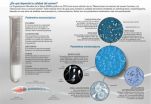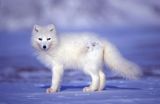(Press-News.org) This may look like yet another video of a dividing cell, but there's a catch. You are looking at chromosomes (red) being pulled apart by the mitotic spindle (green), but it's not a cell, because there's no cell membrane. Like a child sucking an egg out of its shell, Ivo Telley from the European Molecular Biology Laboratory (EMBL) in Heidelberg, Germany, removed these cellular 'innards' from a fruit fly embryo, at a stage when it is essentially a sac full of membrane-less 'cells' that divide and divide without building physical barriers to separate themselves from each other.
"It's the first time we can study ongoing cell division without the cell membrane, and that means we can physically manipulate things," says Telley, "so we can uncover the physical forces involved, and see what are the constraints."
The new technique is described in detail today in Nature Protocols, and has already led Telley and colleagues to a surprising discovery. They found that, although successive divisions fill the embryo with more and more material, leaving less and less space for each spindle, and spindles become smaller as the embryo develops, simply squeezing the 'cell' into tighter quarters doesn't make it produce a smaller spindle.
Combined with the genetic manipulation approaches commonly used in fruit fly studies, the scientists believe their new technique will help to unravel this and other mysteries of how a cell becomes two.
###The work, which started in Thomas Surrey's lab at EMBL, was carried out by Telley and Imre Gáspár in Anne Ephrussi's lab at EMBL. Surrey is now at Cancer Research UK.
The cell that isn't
New technique captures division of membrane-less cells
2013-01-18
ELSE PRESS RELEASES FROM THIS DATE:
Increasing concerns surrounding surrogacy
2013-01-18
COUPLES seeking to build a family, and surrogate mothers overseas who help them, are in danger of emotional, physical and financial exploitation unless UK authorities monitor and regulate the field much more closely, according to a University of Huddersfield professor who has published the results of a detailed investigation.
Eric Blyth – Professor of Social Work at the University of Huddersfield, and based at its Centre for Applied Childhood Studies – is co-author of The changing face of surrogacy in the UK, an article which charts the rapid increase in the numbers of ...
Semen quality of young men in south-east Spain down by 38 percent in the last decade
2013-01-18
The first comparative study on the evolution of sperm quality in young Spanish men over ten years, headed by researchers at the University of Murcia, reveals that spermatozoid concentration in men between 18 and 23 years in the regions of Murcia and Almeria has dropped by an annual average of 2%.
The suspicion that the semen of Spanish men is losing quality now takes force in the case of young men from Murcia and Almeria.
The 'Andrology' journal has published a multidisciplinary and international study, headed by the Department of Preventative Medicine and Public ...
Unrestricted access to the details of deadly eruptions
2013-01-18
Volcanic eruptions have the potential to cause loss of life, disrupt air traffic, impact climate, and significantly alter the surrounding landscape. Knowledge of the past behaviours of volcanoes is key to producing risk assessments of the hazards of modern explosive events.
The open access database of Large Magnitude Explosive Eruptions (LaMEVE) will provide this crucial information to researchers, civil authorities and the general public alike.
Compiled by an international team headed by Dr Sian Crosweller from the Bristol's School of Earth Sciences with support from ...
Breakthrough for solar cell research
2013-01-18
In the latest issue of Science, researchers from Lund University in Sweden have shown how nanowires could pave the way for more efficient and cheaper solar cells.
"Our findings are the first to show that it really is possible to use nanowires to manufacture solar cells", says Magnus Borgström, a researcher in semiconductor physics and the principal author.
Research on solar cell nanowires is on the rise globally. Until now the unattained dream figure was ten per cent efficiency – but now Dr Borgström and his colleagues are able to report an efficiency of 13.8 per cent. ...
Climate change to profoundly affect the Midwest in coming decades
2013-01-18
ANN ARBOR—In the coming decades, climate change will lead to more frequent and more intense Midwest heat waves while degrading air and water quality and threatening public health. Intense rainstorms and floods will become more common, and existing risks to the Great Lakes will be exacerbated.
Those are some of the conclusions contained in the Midwest chapter of a draft report released last week by the federal government that assesses the key impacts of climate change on every region in the country and analyzes its likely effects on human health, water, energy, transportation, ...
ARS scientists test improved stink bug trapping methods
2013-01-18
This press release is available in Spanish.
Baited black traps in a pyramid shape attract significantly more brown marmorated stink bugs than other traps, according to U.S. Department of Agriculture (USDA) scientists. Evaluating stink bug responses to different visual stimuli may help manufacturers design better traps for monitoring the bugs.
Entomologist Tracy Leskey at the Agricultural Research Service (ARS) Appalachian Fruit Research Station in Kearneysville, W.V., focused on visual stimuli that can attract the stink bugs to traps that will help farmers monitor ...
Studying ancient Earth's geochemistry
2013-01-18
Washington, D.C.— Researchers still have much to learn about the volcanism that shaped our planet's early history. New evidence from a team led by Carnegie's Frances Jenner demonstrates that some of the tectonic processes driving volcanic activity, such as those taking place today, were occurring as early as 3.8 billion years ago. Their work is published in Geology.
Upwelling and melting of the Earth's mantle at mid-ocean ridges, as well as the eruption of new magmas on the seafloor, drive the continual production of the oceanic crust. As the oceanic crust moves away ...
Wild animals may contribute to the resurgence of African sleeping sickness
2013-01-18
Wild animals may be a key contributor to the continuing spread of African sleeping sickness, new research published in PLOS Computational Biology shows. The West African form of the disease, also known as Gambiense Human African trypanosomiasis, affects around 10,000 people in Africa every year and is deadly if left untreated.
The disease is caused by a brain-invading parasite transmitted by bites of the tsetse fly, and gets its name from the hallmark symptoms of drowsiness and altered sleeping patterns that affect late-stage patients, along with other physical and neurological ...
Factors linked with survival differences between Black, White kidney failure patients
2013-01-18
Highlights
Residence in areas with higher average household income was linked with improved survival in kidney failure patients.
In White patients, income inequality was associated with mortality.
In Black patients exclusively, residence in highly segregated areas was associated with increased mortality.
More than 590,000 Americans in 2010 were treated for kidney failure.
Washington, DC (January 17, 2013) — Complex socioeconomic and residential factors may account for differences in survival between Black and White kidney failure patients, according to a study ...
Climate events drive a high-arctic vertebrate community into synchrony
2013-01-18
Climate change is known to affect the population dynamics of single species, such as reindeer or caribou, but the effect of climate at the community level has been much more difficult to document. Now, a group of Norwegian scientists has found that extreme climate events cause synchronized population fluctuations among all vertebrate species in a relatively simple high arctic community. These findings may be a bellwether of the radical changes in ecosystem stability that could result from anticipated future increases in extreme events. The findings are published in the ...
LAST 30 PRESS RELEASES:
Scientists reveal our best- and worst-case scenarios for a warming Antarctica
Cleaner fish show intelligence typical of mammals
AABNet and partners launch landmark guide on the conservation of African livestock genetic resources and sustainable breeding strategies
Produce hydrogen and oxygen simultaneously from a single atom! Achieve carbon neutrality with an 'All-in-one' single-atom water electrolysis catalyst
Sleep loss linked to higher atrial fibrillation risk in working-age adults
Visible light-driven deracemization of α-aryl ketones synergistically catalyzed by thiophenols and chiral phosphoric acid
Most AI bots lack basic safety disclosures, study finds
How competitive gaming on discord fosters social connections
CU Anschutz School of Medicine receives best ranking in NIH funding in 20 years
Mayo Clinic opens patient information office in Cayman Islands
Phonon lasers unlock ultrabroadband acoustic frequency combs
Babies with an increased likelihood of autism may struggle to settle into deep, restorative sleep, according to a new study from the University of East Anglia.
National Reactor Innovation Center opens Molten Salt Thermophysical Examination Capability at INL
International Progressive MS Alliance awards €6.9 million to three studies researching therapies to address common symptoms of progressive MS
Can your soil’s color predict its health?
Biochar nanomaterials could transform medicine, energy, and climate solutions
Turning waste into power: scientists convert discarded phone batteries and industrial lignin into high-performance sodium battery materials
PhD student maps mysterious upper atmosphere of Uranus for the first time
Idaho National Laboratory to accelerate nuclear energy deployment with NVIDIA AI through the Genesis Mission
Blood test could help guide treatment decisions in germ cell tumors
New ‘scimitar-crested’ Spinosaurus species discovered in the central Sahara
“Cyborg” pancreatic organoids can monitor the maturation of islet cells
Technique to extract concepts from AI models can help steer and monitor model outputs
Study clarifies the cancer genome in domestic cats
Crested Spinosaurus fossil was aquatic, but lived 1,000 kilometers from the Tethys Sea
MULTI-evolve: Rapid evolution of complex multi-mutant proteins
A new method to steer AI output uncovers vulnerabilities and potential improvements
Why some objects in space look like snowmen
Flickering glacial climate may have shaped early human evolution
First AHA/ACC acute pulmonary embolism guideline: prompt diagnosis and treatment are key
[Press-News.org] The cell that isn'tNew technique captures division of membrane-less cells


